John Deere GM1060, GM1072 User Manual
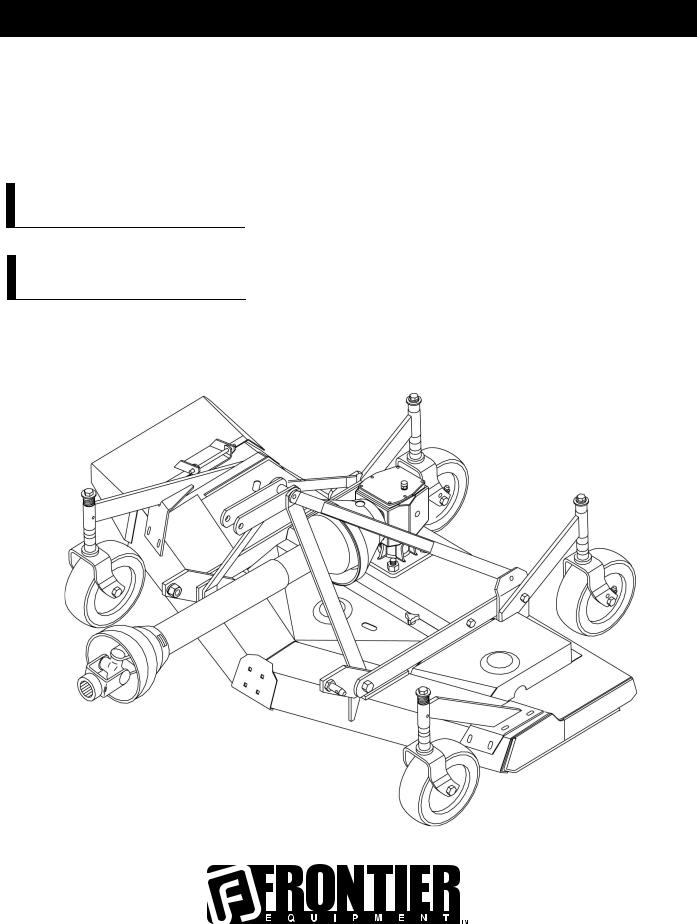
O P E R A T O R ’ S M A N U A L
GROOMING MOWERS
GM1060
GM1072
SIDE DISCHARGE
5WPMAN0242 (Rev. 7/21/2008)
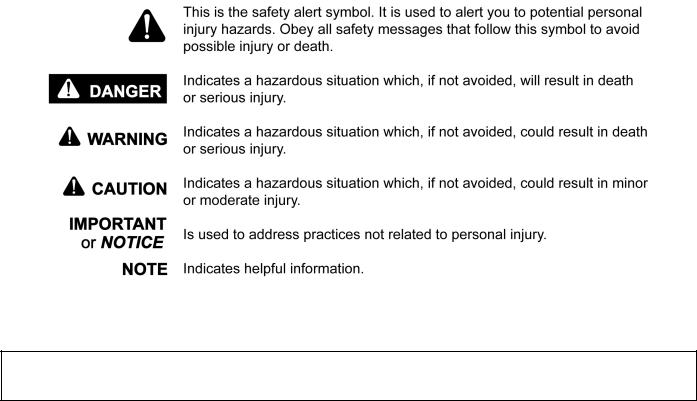
TO THE DEALER:
Assembly and proper installation of this product is the responsibility of the Frontier dealer. Read manual instructions and safety rules. Make sure all items on the Dealer’s Pre-Delivery and Delivery Check Lists in the Operator’s Manual are completed before releasing equipment to the owner.
The dealer must complete the Product Registration form, located on the Frontier website. Failure to complete and return the form does not diminish customer’s warranty rights.
TO THE OWNER:
Read this manual before operating your Frontier equipment. The information presented will prepare you to do a better and safer job. Keep this manual handy for ready reference. Require all operators to read this manual carefully and become acquainted with all the adjustment and operating procedures before attempting to operate. Replacement manuals can be obtained from your selling dealer.
The equipment you have purchased has been carefully engineered and manufactured to provide dependable and satisfactory use. Like all mechanical products, it will require cleaning and upkeep. Lubricate the unit as specified. Observe all safety information in this manual and safety decals on the equipment.
For service, your authorized Frontier dealer has trained mechanics, genuine Frontier service parts, and the necessary tools and equipment to handle all your needs.
Use only genuine Frontier service parts. Substitute parts will void the warranty and may not meet standards required for safe and satisfactory operation. Record the model number and serial number of your equipment in the spaces provided:
Model: ______________________________ |
Date of Purchase: _____________________ |
Serial Number: (see Safety Decal section for location) ____________________________________
Provide this information to your dealer to obtain correct repair parts.
Throughout this manual, the term NOTICE is used to indicate that failure to observe can cause damage to equipment. The terms CAUTION, WARNING and DANGER are used in conjunction with the Safety-Alert Symbol, (a triangle with an exclamation mark), to indicate the degree of hazard for items of personal safety.
2 Introduction
Frontier (Rev. 7/20/2007)

TABLE OF CONTENTS
INTRODUCTION . . . . . . . . . . . . . . . . . . . . . . . . . . . . . . . . . . . . . . . . . . . . . . 2 SPECIFICATIONS. . . . . . . . . . . . . . . . . . . . . . . . . . . . . . . . . . . . . . . . . . . . . 4 GENERAL INFORMATION . . . . . . . . . . . . . . . . . . . . . . . . . . . . . . . . . . . . . . 4 SAFETY RULES . . . . . . . . . . . . . . . . . . . . . . . . . . . . . . . . . . . . . . . . . . . . . 5-6 SAFETY DECALS . . . . . . . . . . . . . . . . . . . . . . . . . . . . . . . . . . . . . . . . . . . . 7-8 OPERATION . . . . . . . . . . . . . . . . . . . . . . . . . . . . . . . . . . . . . . . . . . . . . . . . . 9 OWNER SERVICE . . . . . . . . . . . . . . . . . . . . . . . . . . . . . . . . . . . . . . . . . . . 13 TROUBLESHOOTING . . . . . . . . . . . . . . . . . . . . . . . . . . . . . . . . . . . . . . . . 18 DEALER SERVICE . . . . . . . . . . . . . . . . . . . . . . . . . . . . . . . . . . . . . . . . . . . 20 ASSEMBLY . . . . . . . . . . . . . . . . . . . . . . . . . . . . . . . . . . . . . . . . . . . . . . . . . 28 DEALER CHECK LISTS . . . . . . . . . . . . . . . . . . . . . . . . . . . . . . . . . . . . . . . 32 PARTS INDEX. . . . . . . . . . . . . . . . . . . . . . . . . . . . . . . . . . . . . . . . . . . . . . . 33 BOLT TORQUE CHART . . . . . . . . . . . . . . . . . . . . . . . . . . . . . . . . . . . . . . . 46 BOLT SIZE CHART & ABBREVIATIONS . . . . . . . . . . . . . . . . . . . . . . . . . . 47 INDEX . . . . . . . . . . . . . . . . . . . . . . . . . . . . . . . . . . . . . . . . . . . . . . . . . . . . . 48 PRODUCT WARRANTY . . . . . . . . . . . . . . . . . . . . . . . . . . . . . . . . . . . . . . . 50 REPLACEMENT PARTS WARRANTY . . . . . . . . . . . . INSIDE BACK COVER
!LEA EL INSTRUCTIVO!
Si no lee Ingles, pida ayuda a alguien que si lo lea para que le traduzca las medidas de seguridad.
5WPMAN0242 (Rev. 5/2/2008) |
Introduction 3 |
|
|
|
|
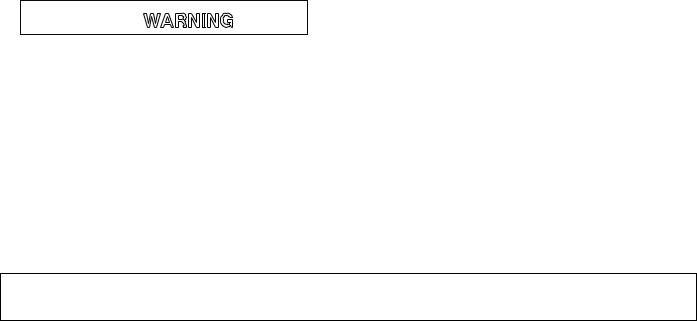
SPECIFICATIONS
|
GM1060 |
GM1072 |
3-Point Hitch |
Category 1 |
Category 1 |
Cutting Width |
60" (1524 mm) |
72" (1829 mm) |
Cutting Height Range |
1.5" - 6" |
1.5" - 6" |
|
(38 - 152 mm) |
(38 - 152 mm) |
Shipping Weight (Approximate) |
500 lbs (226.8 kg) |
550 lbs (249.5 kg) |
Blade Speed (feet per minute) |
15,200 |
16,600 |
Blade Speed (RPM) |
2,795 |
2,571 |
Blade Spindles |
3 |
3 |
Number of Blades |
3 |
3 |
Universal Drive Series |
Category 3 |
Category 3 |
Caster Wheels |
3.5" x 10.25" |
3.5" x 10.25" |
|
(89 - 260 mm) |
(89 - 260 mm) |
Tractor PTO Speed RPM |
540 |
540 |
Recommended Maximum |
|
|
Tractor Horsepower |
35 |
35 |
Mower Frame Thickness |
8 GA |
8 GA |
|
|
|
GENERAL INFORMATION

Some illustrations in this manual show the equipment with safety shields removed to provide a better view. This equipment should never be operated with any necessary safety shielding removed.
The purpose of this manual is to assist you in operating and maintaining your mower. Read it carefully. It furnishes information and instructions that will help you achieve years of dependable performance. These instructions have been compiled from extensive field experience and engineering data. Some information
may be general in nature, due to unknown and varying operating conditions. However, through experience and these instructions, you should be able to develop procedures suitable to your particular situation.
The illustrations and data used in this manual were current at the time of printing. However, due to possible inline production changes, your machine may vary slightly in detail. We reserve the right to redesign and change the machines as may be necessary without notification.
Throughout this manual, references are made to right and left directions. These are determined by standing behind the tractor facing the direction of forward travel.
4 Introduction |
5WPMAN0242 (Rev. 7/21/2008) |
|

SAFETY RULES
ATTENTION! BECOME ALERT! YOUR SAFETY IS INVOLVED!
Safety is a primary concern in the design and manufacture of our products. Unfortunately, our efforts to provide safe equipment can be wiped out by an operator’s single careless act.
In addition to the design and configuration of equipment, hazard control and accident prevention are dependent upon the awareness, concern, judgement, and proper training of personnel involved in the operation, transport, maintenance and storage of equipment.
It has been said “The best safety device is an informed, careful operator.” We ask you to be that kind of operator.
TRAINING
Safety instructions are important! Read all attachment and power unit manuals; follow all safety rules and safety decal information. (Replacement manuals and safety decals are available from your dealer.) Failure to follow instructions or safety rules can result in serious injury or death.
from being run over or crushed. Keep foldable ROPS system in “locked up” position at all times.
Remove accumulated debris from this equipment, power unit, and engine to avoid fire hazard.
Make sure all safety decals are installed. Replace if damaged. (See Safety Decals section for location.)
Make sure shields and guards are properly installed and in good condition. Replace if damaged.
A minimum 20% of tractor and equipment weight must be on the tractor front wheels when attachments are in transport position. Without this weight, tractor could tip over, causing personal injury or death. The weight may be attained with a loader, front wheel weights, ballast in tires or front tractor weights. Weigh the tractor and equipment. Do not estimate.
Inspect and clear area of stones, branches, or other hard objects that might be thrown, causing injury or damage.
If you do not understand any part of this manual and need assistance, see your dealer.
Know your controls and how to stop engine and attachment quickly in an emergency.
Operators must be instructed in and be capable of the safe operation of the equipment, its attachments, and all controls. Do not allow anyone to operate this equipment without proper instructions.
Never allow children or untrained persons to operate equipment.
PREPARATION
Check that all hardware is properly installed. Always tighten to torque chart specifications unless instructed otherwise in this manual.
Always wear relatively tight and belted clothing to avoid getting caught in moving parts. Wear sturdy, rough-soled work shoes and protective equipment for eyes, hair, hands, hearing, and head; and respirator or filter mask where appropriate.
Make sure attachment is properly secured, adjusted, and in good operating condition.
Make sure spring-activated locking pin or collar slides freely and is seated firmly in tractor PTO spline groove.
Power unit must be equipped with ROPS or ROPS cab and seat belt. Keep seat belt securely fastened. Falling off power unit can result in death
OPERATION
Do not put mower into service unless discharge chute is installed and in good condition. Replace if damaged.
Keep bystanders away from equipment.
Never direct discharge toward people, animals, or property.
Do not operate or transport equipment while under the influence of alcohol or drugs.
Operate only in daylight or good artificial light.
Keep hands, feet, hair, and clothing away from equipment while engine is running. Stay clear of all moving parts.
Always comply with all state and local lighting and marking requirements.
Never allow riders on power unit or attachment.
Power unit must be equipped with ROPS or ROPS cab and seat belt. Keep seat belt securely fastened. Falling off power unit can result in death from being run over or crushed. Keep foldable ROPS system in “locked up” position at all times.
Always sit in power unit seat when operating controls or starting engine. Securely fasten seat belt, place transmission in neutral, engage brake, and ensure all other controls are disengaged before starting power unit engine.
(Safety Rules continued on next page)
GM1060/1072 SD SR (Rev. 9/6/2005)
Safety 5

SAFETY RULES
ATTENTION! BECOME ALERT! YOUR SAFETY IS INVOLVED!
(Safety Rules continued from previous page)
Operate tractor PTO at 540 RPM. Do not exceed.
Look down and to the rear and make sure area is clear before operating in reverse.
Do not operate or transport on steep slopes.
Do not stop, start, or change directions suddenly on slopes.
Use extreme care and reduce ground speed on slopes and rough terrain.
Watch for hidden hazards on the terrain during operation.
Stop power unit and equipment immediately upon striking an obstruction. Turn off engine, remove key, inspect, and repair any damage before resuming operation.
TRANSPORTATION
Power unit must be equipped with ROPS or ROPS cab and seat belt. Keep seat belt securely fastened. Falling off power unit can result in death from being run over or crushed. Keep foldable ROPS system in “locked up” position at all times.
Always comply with all state and local lighting and marking requirements.
Never allow riders on power unit or attachment.
Do not operate PTO during transport.
Look down and to the rear and make sure area is clear before operating in reverse.
Do not operate or transport on steep slopes.
Do not operate or transport equipment while under the influence of alcohol or drugs.
MAINTENANCE
Before performing any service or maintenance, lower equipment to ground or block securely, turn off engine, remove key, and disconnect driveline from tractor PTO.
Do not modify or alter or permit anyone else to modify or alter the equipment or any of its components in any way.
Always wear relatively tight and belted clothing to avoid getting caught in moving parts. Wear
sturdy, rough-soled work shoes and protective equipment for eyes, hair, hands, hearing, and head; and respirator or filter mask where appropriate.
Keep all persons away from operator control area while performing adjustments, service, or maintenance.
Make certain all movement of equipment components has stopped before approaching for service.
Frequently check blades. They should be sharp, free of nicks and cracks, and securely fastened.
Use a new Nylok blade bolt and cup washers when you replace the blade. Do not substitute any bolt for the special blade bolt. It is self-locking, meeting the non-loosening requirements for this application.
Do not handle blades with bare hands. Careless or improper handling may result in serious injury.
Your dealer can supply genuine replacement blades. Substitute blades may not meet original equipment specifications and may be dangerous.
Tighten all bolts, nuts, and screws to torque chart specifications. Check that all cotter pins are installed securely to ensure equipment is in a safe condition before putting unit into service.
Make sure all safety decals are installed. Replace if damaged. (See Safety Decals section for location.)
Make sure shields and guards are properly installed and in good condition. Replace if damaged.
STORAGE
Block equipment securely for storage.
Keep children and bystanders away from storage area.
Follow manual instructions for storage.
6 Safety
GM1060/1072 SD SR (Rev. 9/6/2005)
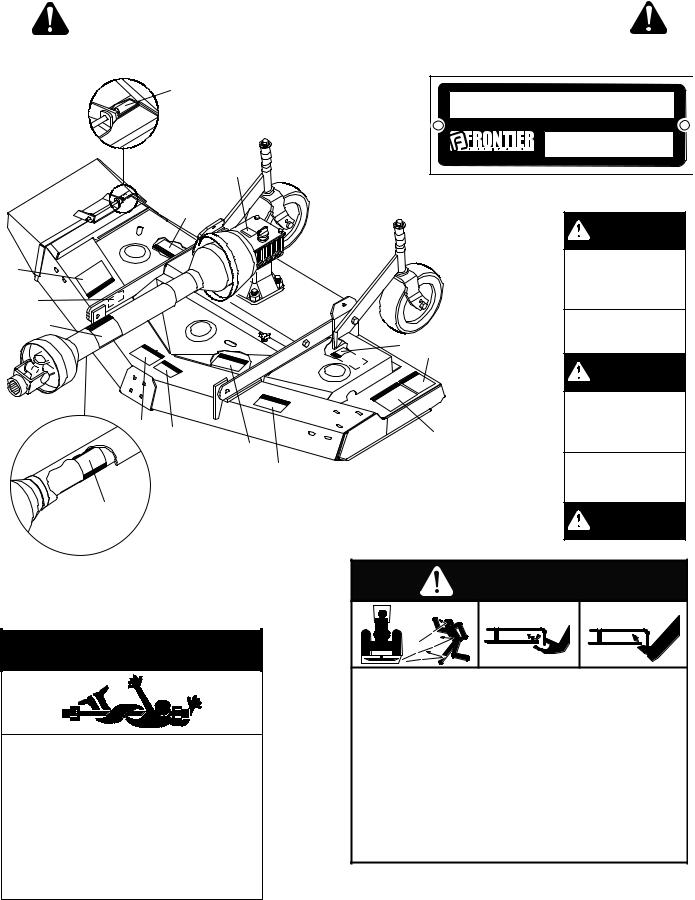
SAFETY & INSTRUCTIONAL DECALS
ATTENTION! BECOME ALERT! YOUR SAFETY IS INVOLVED!
Replace Immediately If Damaged!
|
|
4 |
|
|
|
|
|
|
|
|
|
PRODUCT IDENTIFICATION NUMBER |
|
|
|
|
|
|
LENEXA, KS, U.S.A. |
|
|
|
10 |
|
|
|
|
|
|
|
|
|
7 - Serial Number Plate |
|
|
|
3 |
|
|
|
|
|
|
|
|
|
9 - 5WP33347 |
|
2 |
|
|
|
|
|
|
7 |
|
|
|
|
|
|
1 |
|
|
|
|
|
|
|
|
|
|
|
|
|
|
|
|
|
3 |
|
|
|
|
|
|
6 |
|
|
|
|
|
|
|
|
|
|
|
|
|
|
|
|
|
1 |
3 |
|
|
5 |
|
|
|
|
|
|
||
|
|
8 |
|
|
|
|
|
|
12 |
CD3977B |
|
|
|
|
|
|
|
|
|
|
|
|
|
|
|
|
|
|
|
GM1060 Shown; |
|
|
|
33347E |
9 |
|
|
|
|
|
|
|
|
GM1072 Similar |
|
|
|
|
|
|
|
2 - 5WP18863 |
|
||
|
|
|
|
|
DANGER |
|
1 - 5WP18864 |
|
|
|
|
|
|
 DANGER
DANGER
|
|
ROTATING BLADES AND |
|
|
|
THROWN OBJECTS |
|
|
|
Do not put hands or feet under or into mower when |
|
|
|
engine is running. |
|
ROTATING DRIVELINE |
|
Before mowing, clear area of objects that may be |
|
|
|
||
CONTACT CAN CAUSE DEATH |
thrown by blade. |
||
KEEP AWAY! |
|
Keep bystanders away. |
|
DO NOT OPERATE WITHOUT - |
Keep discharge chute and guards in place and in good |
||
condition. |
|||
All driveline guards, tractor and |
|
||
|
BLADE CONTACT OR THROWN OBJECTS CAN |
||
equipment shields in place |
|
||
|
CAUSE SERIOUS INJURY OR DEATH. |
||
Drivelines securely attached at both ends |
|||
18863-B |
|||
Driveline guards that turn freely on |
|
|
|
driveline |
18864-C |
(Safety Decals continued on next page) |
|
|
|||
5WPMAN0242 (Rev. 7/21/2008) |
Safety 7 |
|
|
|
|
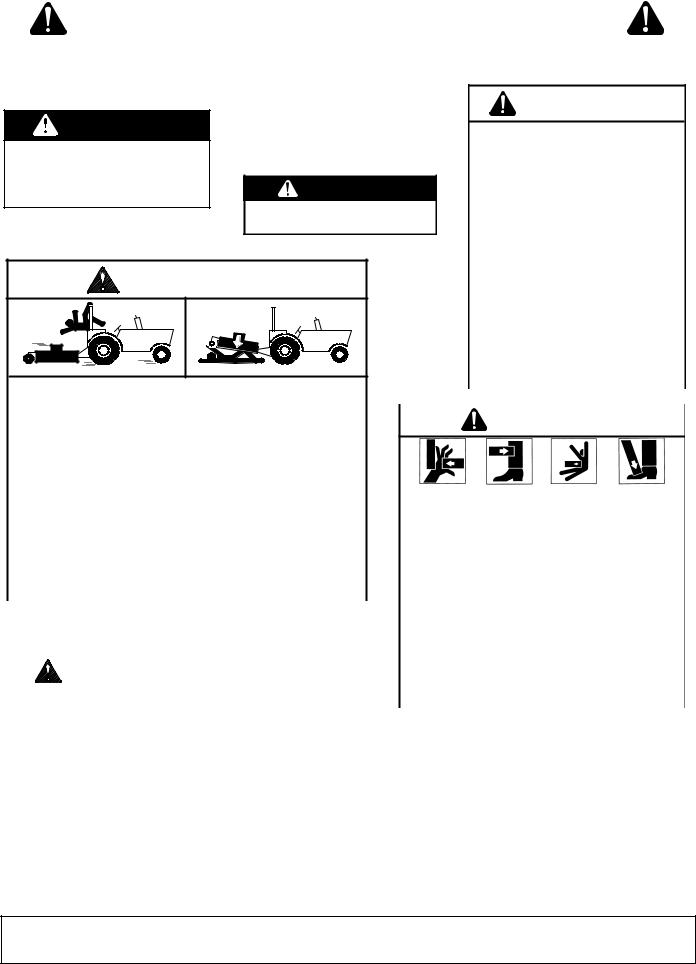
SAFETY & INSTRUCTIONAL DECALS
ATTENTION! BECOME ALERT! YOUR SAFETY IS INVOLVED!
Replace Immediately If Damaged!
(Safety Decals continued from previous page) |
|
|
|
|
6 - 5WP18877 |
WARNING |
|
DANGER |
3 - 5WP18867 |
|
|
|
|
||
|
|
TO AVOID SERIOUS |
|
SHIELD MISSING |
|
|
|
4 - 5WP18869 |
|
INJURY OR DEATH: |
|
DO NOT OPERATE |
DANGER |
|
Read Operator's Manual (available |
PUT SHIELD ON |
|
from dealer) and follow all safety |
|
18867--B |
SHIELD MISSING |
-B |
precautions. |
|
|
||
|
|
Keep all shields in place and in good |
|
|
DO NOT OPERATE - PUT SHIELD ON 18869 |
||
|
condition. |
||
5 - 5WP18865 |
|
|
Operate mower from tractor seat only. |
WARNING |
|
Lower mower, stop engine and remove |
|
|
key before dismounting tractor. |
||
|
Allow no children or untrained persons |
||
|
|
|
|
|
|
|
to operate equipment. |
|
|
|
Do not transport towed or |
|
|
|
semi-mounted units over 20 mph. |
FAILURE TO OPERATE SAFELY
CAN RESULT IN
INJURY OR DEATH.
18877-C
FALLING OFF CAN RESULT IN BEING RUN OVER. |
|
|
Tractor must be equipped with ROPS (or ROPS CAB) and seat |
|
|
|
WARNING |
|
times. |
|
|
belt. Keep foldable ROPS systems in “locked up” position at all |
|
|
Buckle Up! Keep seat belt securely fastened.
Allow no riders.
|
RAISED EQUIPMENT CAN DROP AND CRUSH. |
|
|
|
|
||||||||
|
|
|
|
|
|||||||||
|
Before working underneath, follow all instructions and safety rules in |
CRUSHING AND PINCHING HAZARD |
|||||||||||
|
operator’s manual and securely block up all corners of equipment |
Be extremely careful handling various parts of |
|||||||||||
|
with jack stands. |
|
|
|
|
|
|
|
|||||
|
|
|
|
|
|
|
|
the machine. They are heavy and hands, fingers, |
|||||
|
Securely blocking prevents equipment dropping from hydraulic leak- |
||||||||||||
|
feet, and other body parts could be crushed or |
||||||||||||
|
down, hydraulic system failures or mechanical component failures. |
||||||||||||
|
pinched between tractor and implement. |
|
|||||||||||
|
|
|
|
|
|
|
|
|
|
|
|
||
|
FALLING OFF OR FAILING TO BLOCK SECURELY CAN |
Operate tractor controls from tractor seat only. |
|||||||||||
|
RESULT IN SERIOUS INJURY OR DEATH. |
18865--C |
Do not stand between tractor and implement |
||||||||||
|
|
|
|
|
|
|
|
|
|
|
when tractor is in gear. |
|
|
|
|
|
|
|
|
|
|
|
|
|
|
||
|
|
|
|
|
|
|
|
|
|
|
Make sure parking brake is engaged before |
||
|
8 - 5WP18866 |
|
|
|
|
|
|
|
going between tractor and implement. |
|
|||
|
|
|
|
|
|
|
|
Stand clear of machine while in operation or |
|||||
|
|
|
|
|
|
|
|
|
|
|
when it is being raised or lowered. |
|
|
|
|
|
WARNING |
|
|
|
|
|
|
||||
|
|
|
|
12 - 5WP1003751 |
|
FAILURE TO FOLLOW THESE |
|
||||||
|
|
|
|
|
INSTRUCTIONS COULD RESULT IN |
|
|||||||
|
|
|
|
|
|||||||||
|
|
|
|
|
|
|
|
SERIOUS INJURY OR DEATH. |
1003751-A |
||||
|
|
|
|
|
|
|
|
|
|||||
|
|
|
|
|
|
|
|
|
|||||
|
|
|
540 RPM |
|
|
|
|
|
|
|
|
|
|
|
|
|
|
|
|
|
BE CAREFUL! |
|
|||||
|
! |
" #$ |
|
Use a clean, damp cloth to clean safety decals. |
|
||||||||
|
|
|
|
18866-D |
|
|
|||||||
|
|
|
|
|
|
|
|
|
|
|
|
||
|
|
|
|
|
|
|
Avoid spraying |
too |
close to decals when using a |
||||
|
|
|
|
|
|
|
|||||||
|
10 - 5WP1004114 |
|
|
|
pressure washer; |
high-pressure water can |
enter |
||||||
|
|
|
|
|
|
|
through very small scratches or under edges of decals |
||||||
|
|
|
DANGER |
|
|
|
|||||||
|
|
|
|
|
|
causing them to peel or come off. |
|
||||||
|
If shaft connection is visible, shield |
|
Replacement safety decals can be ordered free from |
||||||||||
|
is missing. Replace shield before |
|
|||||||||||
|
operating equipment. |
1004114 |
|
|
your dealer. |
|
|
|
|||||
|
|
|
|
|
|
|
|
|
|
||||
8 Safety |
5WPMAN0242 (Rev. 5/2/2008) |
|
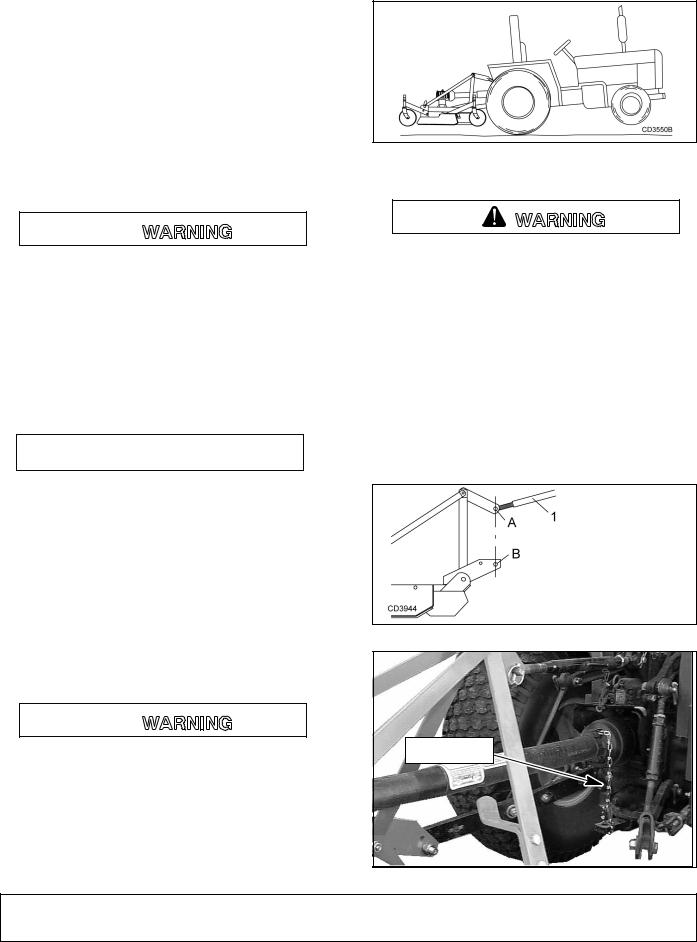
OPERATION
The operator is responsible for the safe operation of the mower. The operator must be properly trained. Operators should be familiar with the mower, tractor, and all safety practices before starting operation. Read the safety rules and safety decals on pages 5 to 8.
This mower is designed for lawn and grass mowing. It is not designed for rough conditions or heavy weed mowing. It is equipped with suction type blades for best results in lawn mowing.
Recommended mowing speed for most conditions is from 2 to 5 mph.

Never allow children or untrained persons to operate equipment.
Keep bystanders away from equipment.
Make sure spring-activated locking pin or collar slides freely and is seated firmly in tractor PTO spline groove.
Operate tractor PTO at 540 RPM. Do not exceed.
 CAUTION
CAUTION
Stop power unit and implement immediately upon striking an obstruction. Dismount power unit, using proper procedure. Inspect and repair any damage before resuming operation.
Always wear relatively tight and belted clothing to avoid getting caught in moving parts. Wear sturdy, rough-soled work shoes and protective equipment for eyes, hair, hands, hearing, and head; and respirator or filter mask where appropriate.
TRACTOR STABILITY

A minimum 20% of tractor and equipment weight must be on the tractor front wheels when attachments are in transport position. Without this weight, tractor could tip over, causing personal injury or death. The weight may be attained with a loader, front wheel weights, ballast in tires or front tractor weights. Weigh the tractor and equipment. Do not estimate.
5WPMAN0242 (Rev. 5/2/2008) |
Operation 9 |
|
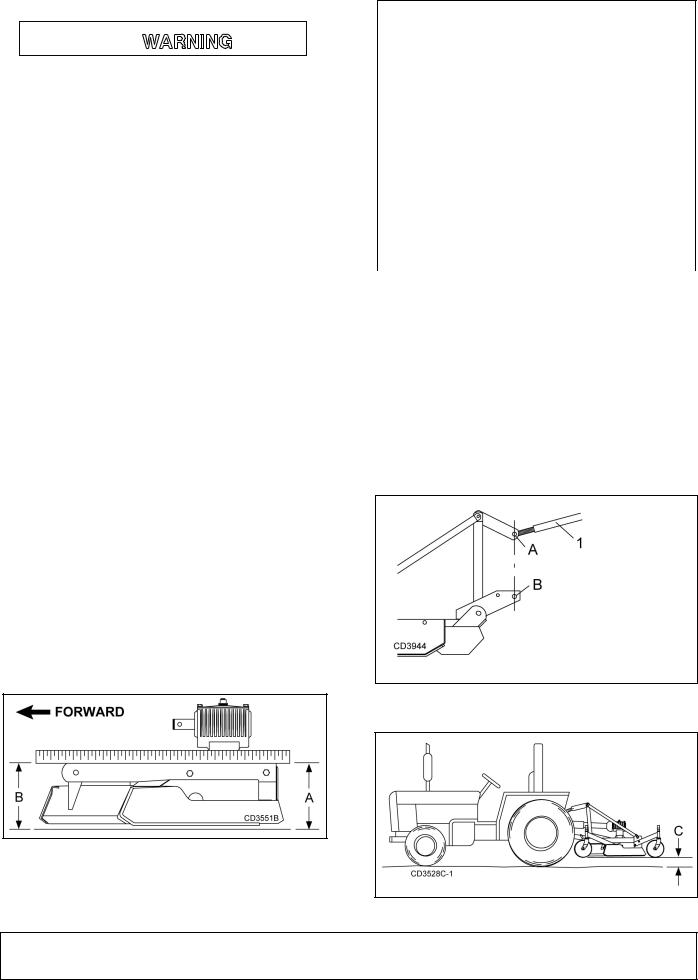
CUTTING HEIGHT ADJUSTMENT

Keep all persons away from operator control area while performing adjustments, service, or maintenance.
NOTICE
■ Avoid low cutting heights. Striking the ground with blades produces one of the most damaging shock loads a mower can encounter. Allowing blades to contact ground repeatedly will cause damage to mower and drive.
1.Level mower from side to side. Check by measuring from mower frame to the ground at each deck rail.
2.Adjust, using tractor 3-point arm leveling device.
NOTE: Best mowing results will be obtained with front of mower level with or slightly lower than the rear.
3.Control cutting height with tractor 3-point arms and front and rear caster wheel adjustment.
4.Raise rear of mower, move caster adjustment spacers under caster arms. Hex opening of blade wrench fits bolts on top of caster shaft.
5.Raise front of mower with tractor 3-point arms. Move spacers under front caster wheel arms.
NOTE: Cutting height is the distance between the blade and the ground. The blades are 7-3/4" below the top of the deck rail on the GM1060 and 8-3/4" below the top of the deck rail on the GM1072. To check cutting height, place a straight edge along top edge of deck rail as shown in Figure 4.
6.Measure from bottom of straight edge to the ground at locations A and B. Subtract 7-3/4" on GM1060 (8-3/4" on GM1072) from measurement B to determine cutting height.
Figure 4. Cutting Height Adjustment
NOTE: Remember, measurement at location A, Figure 4, should not be less than location B and should not be over 1/2" greater than location B.
SPACERS REQUIRED UNDER
CASTER ARM PIVOT TUBE
Cut |
1/2" |
3/4" |
1" |
1-1/4" |
Height |
Spacer |
Spacer |
Spacer |
Spacer |
|
|
|
|
|
1-1/2" |
|
|
|
|
|
|
|
|
|
2" |
1 |
|
|
|
|
|
|
|
|
2-1/2" |
|
|
1 |
|
|
|
|
|
|
3" |
1 |
|
1 |
|
|
|
|
|
|
3-1/2" |
|
|
2 |
|
|
|
|
|
|
4" |
1 |
|
2 |
|
|
|
|
|
|
4-1/2" |
|
1 |
1 |
1 |
|
|
|
|
|
5" |
1 |
1 |
1 |
1 |
|
|
|
|
|
5-1/2" |
|
1 |
2 |
1 |
|
|
|
|
|
6" |
1 |
1 |
2 |
1 |
|
|
|
|
|
Table 1: Cutting Height Chart
TRACTOR TOP LINK ADJUSTMENT
When the cutting height is set, adjust tractor top link until mower top link attachment point A is aligned vertically with mower hitch pin B.
Adjust tractor top link so mower is level between caster wheel and ground (dimension C, Figure 6). This will allow the mower to follow ground contour.
1. Tractor top link A. Mower top link
attachment point B. Mower hitch pin
Figure 5. Top Link Adjustment
Figure 6. Gauge Wheel Distance
10 Operation
(Rev. 7/21/2008) 5WPMAN0242 (Rev. 5/2/2008)
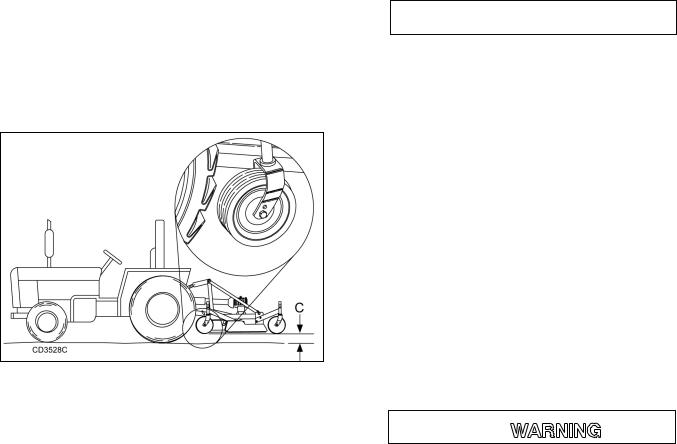
FRONT CASTER WHEEL INTERFERENCE CHECK
NOTICE
■ Do not operate tractor and mower until this interference check has been performed. If you change tractors, you must perform the check for that mounting.
Perform this check with all of the spacers and springs above the caster wheel arm. This will place the caster wheels in their highest position and provide the lowest cutting height for the mower.
Raise mower with tractor hydraulics to 16" at dimension C or maximum height of tractor lift, whichever is less.
Pivot both front caster wheels forward and check that there is clearance between caster wheels and tractor tires. If there is interference, you must not use front caster wheels on the mower with this tractor.
Figure 7. Front Gauge Wheel Interference Check
FRONT ROLLER (OPTIONAL)
The caster wheels and side skids effectively reduce scalping in most cases. However, you may encounter areas where the caster wheels and/or side skids drop into depressions and allow center of mower to contact ground and scalp. An optional front roller may be installed to minimize scalping.
For Installation instructions See “Front Roller Installation (Optional)” on page 30.
Power for operating mower is supplied by tractor PTO. Operate PTO at 540 rpm. Know how to stop tractor and mower quickly in an emergency.
If mower becomes plugged causing belt to slip for over two seconds, follow these steps:
1.Maneuver equipment into a previously cut area and allow mower to clear accumulated material.
2.Continue running at least two minutes, allowing pulleys to cool. Stopping the mower in contact with a very hot pulley will bake and ruin belt.
Proper ground speed will depend upon the terrain, the height, and type and density of material to be cut.
Normally, ground speed will range from 2 to 5 mph. Tall dense material should be cut at a low speed; thin medium-height material can be cut at a faster ground speed.
OPERATING TECHNIQUE
 CAUTION
CAUTION
Stop power unit and implement immediately upon striking an obstruction. Dismount power unit, using proper procedure. Inspect and repair any damage before resuming operation.
Always operate tractor PTO at 540 rpm to maintain proper blade speed and produce a clean cut.
Under certain conditions, tractor tires may roll some grass down and prevent it from being cut at the same height as the surrounding area. When this occurs, reduce your ground speed, but maintain PTO at 540 rpm. The lower ground speed will permit grass to partially rebound.
In general, lower cutting heights give a more even cut and leave less tire tracks. However, it is better to cut grass frequently rather than too short. Short grass deteriorates rapidly in hot weather and invites weed growth during growing seasons. Follow local recommendations for the suitable cutting height in your area.
OPERATING TIPS

Inspect and clear area of stones, branches, or other hard objects that might be thrown, causing injury or damage.
NOTICE
■ Mower vibration tends to loosen bolts during operation. All hardware should be checked regularly to maintain proper torque. It is a good practice to check mower before each operation to ensure all hardware is secure.
Extremely tall material should be cut twice. Set mower at a higher cutting height for the first pass. Then cut at desired height, 90 degrees to the first pass.
Remember, sharp blades produce cleaner cuts and require less power.
5WPMAN0242 (Rev. 5/2/2008) |
Operation 11 |
|
|
|
|
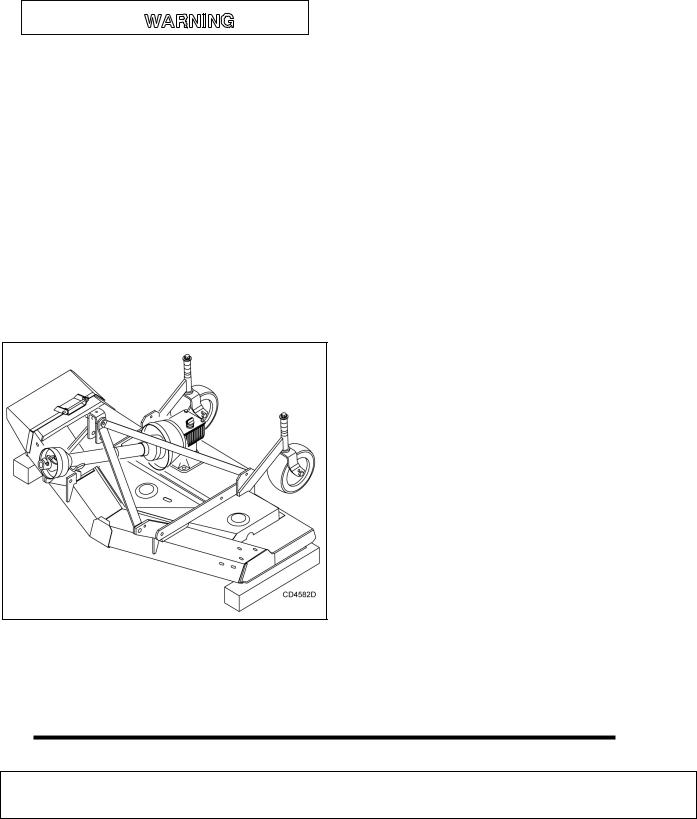
Analyze area to be cut to determine the best procedure. Consider height and type of grass and terrain type: hilly, level, or rough.
Plan your mowing pattern to travel straight forward whenever possible. Mow with uncut grass to the right. This will distribute the clippings over the cut area.
UNEVEN TERRAIN

Do not operate or transport on steep slopes.
Do not stop, start, or change directions suddenly on slopes.
Use extreme care and reduce ground speed on slopes and rough terrain.
Watch for hidden hazards on the terrain during operation.
Pass diagonally through sharp dips and avoid sharp drops to prevent hanging up tractor and mower.
Practice will improve your skills in maneuvering rough terrain.
STORAGE
Figure 8. Mower Storage Position
1.Disengage tractor PTO and raise mower with the 3-point hitch.
2.Collapse driveshaft as far as possible and store it in PTO hanger bracket to prevent ground contact.
3.Place blocks under mower side skids. Lower mower onto blocks, disconnect mower from tractor 3-point hitch, and carefully drive tractor away from mower.
PRE-OPERATION CHECK LIST
(OWNER'S RESPONSIBILITY)
___ |
Review and follow all safety rules and safety |
|
decal instructions on pages 5 through 8. |
___ |
Check that all safety decals are installed and in |
|
good condition. Replace if damaged. |
___ |
Check that all shields and guards are properly |
|
installed and in good condition. Replace if dam- |
|
aged. |
___ |
Check that all hardware and cotter pins are prop- |
|
erly installed and secured. |
___ |
Check to ensure blades are sharp, in good condi- |
|
tion, and installed correctly. Replace if damaged. |
___ |
Check that equipment is properly and securely |
|
attached to tractor. |
___ |
Make sure driveline spring-activated locking pin |
|
or collar slides freely and is seated firmly in trac- |
|
tor PTO spline groove. |
___ |
Make sure the driveline guards and tether chains |
|
are in good condition. Guards must rotate freely |
|
on driveline. Fasten tether chains to the tractor |
|
and the equipment as instructed. |
___ |
Inspect area and remove stones, branches or |
|
other hard objects that might be thrown, causing |
|
injury or damage. |
___ |
Do not allow riders. |
___ Check all lubrication points and grease as instructed in Lubrication Information on page 14. Make sure the PTO slip joint is lubricated and that the gearbox fluid levels are correct.
___ Set tractor PTO at correct rpm for your equipment.
___ Make sure tractor ROPS or ROPS cab and seat belt are in good condition. Keep seat belt securely fastened during operation.
___ Before starting engine, operator must be in tractor seat with seat belt fastened. Place transmission in neutral or park, engage brake, and disengage tractor PTO.
12 Operation |
5WPMAN0242 (Rev. 5/2/2008) |
|

OWNER SERVICE
The information in this section is written for operators who possess basic mechanical skills. If you need help, your dealer has trained service technicians available. For your protection, read and follow the safety information in this manual.
 CAUTION
CAUTION
Always wear relatively tight and belted clothing to avoid entanglement in moving parts. Wear sturdy, rough-soled work shoes and protective equipment for eyes, hair, hands, hearing, and head; and respirator or filter mask where appropriate.

Never go underneath equipment (lowered to the ground or raised) unless it is properly blocked and secured. Never place any part of the body underneath equipment or between moveable parts even when the engine has been turned off. Hydraulic system leak down, hydraulic system failures, mechanical failures, or movement of control levers can cause equipment to drop or rotate unexpectedly and cause severe injury or death. Follow Operator's Manual instructions for working underneath and blocking requirements or have work done by a qualified dealer.
Keep all persons away from operator control area while performing adjustments, service, or maintenance.
Before working underneath, carefully read Operator’s Manual instructions, disconnect driveline, raise mower, securely block up all corners with jackstands, and check stability. Secure blocking prevents equipment from dropping due to hydraulic leak down, hydraulic system failures, or mechanical component failures.
Make sure spring-activated locking pin or collar slides freely and is seated firmly in tractor PTO spline groove.
BLOCKING METHOD
Jackstands, with a load rating of 1,000 pounds or more, are the only approved blocking device for this mower. A minimum of four jackstands, located under the mower as shown in Figure 9, must be installed before working underneath this unit. Do not position jackstands under wheels, axles, or wheel supports because these components can rotate.
Do not work underneath unless it is properly attached to tractor (see Operation section), the brakes set, key removed, and the mower blocked securely. Tighten tractor lower 3-point arm anti-sway mechanisms to prevent side to side movement.
When blocking, you must consider overall stability of the unit. Just placing jackstands under the unit will not ensure your safety. The working surface must be level and solid to support the weight on the jackstands. Ensure jackstands are stable both top and bottom, and mower is approximately level. With full mower weight lowered on jackstands, test blocking stability before working underneath mower.
Figure 9. Blocking Method
5WPMAN0242 (Rev. 7/21/2008) |
Owner Service 13 |
|
|
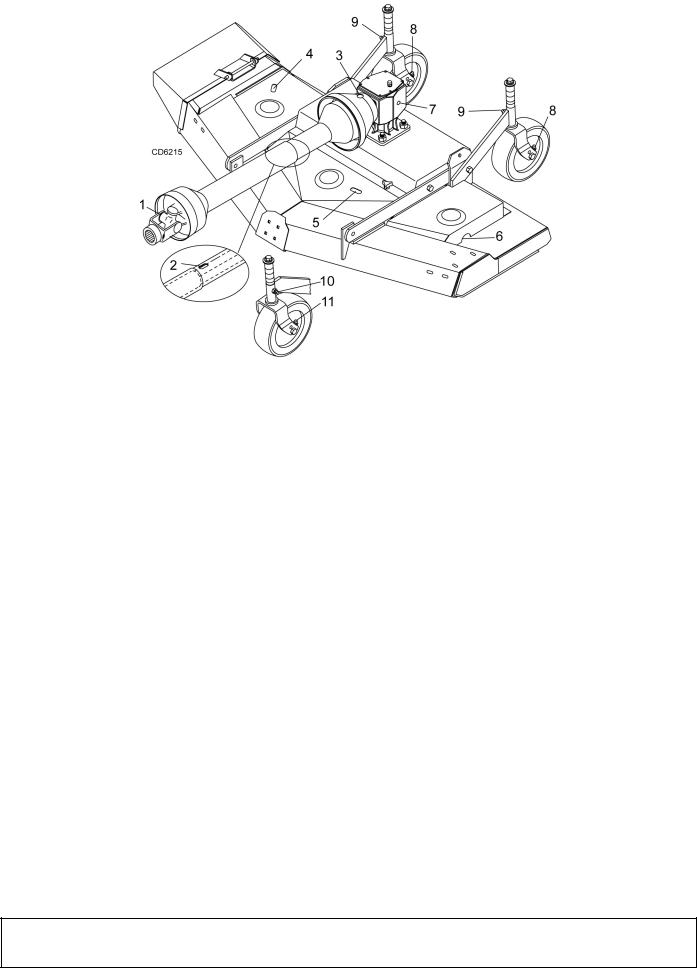
|
|
|
|
|
|
Ref |
Description |
Frequency |
|
|
No. |
|
||
|
|
|
|
|
|
|
|
|
|
|
1 |
Front U-Joint |
8 Hours |
|
|
2 |
Slip Joint (1 location on shaft, access through slot) |
8 Hours |
|
|
3 |
Rear U-Joint |
8 Hours |
|
|
4 |
Right Spindle (Access through slot) |
24 Hours |
|
|
5 |
Center Spindle (Access through slot) |
24 Hours |
|
|
6 |
Left Spindle (Access through slot) |
24 Hours |
|
|
7 |
Gearbox (Fill to center of horizontal shaft with SAE 80W |
Check Daily |
|
|
|
or 90W gear lube) |
|
|
|
8 |
Caster Wheel (Right and Left) |
8 Hours |
|
|
9 |
Caster Pivot (Right and Left) |
8 Hours |
|
|
10 |
Front Caster Wheel Pivot (Right and Left) |
8 Hours |
|
|
11 |
Front Caster Wheel (Right and Left) |
8 Hours |
|
|
|
|
|
|
|
|
|
|
|
Figure 10. Lubrication Points & Chart
LUBRICATION INFORMATION
Do not let excess grease collect on or around parts, particularly when operating in sandy areas.
Figure 10Figure 10 shows the lubrication points. The accompanying chart gives the frequency of lubrication in operating hours, based on normal operating conditions. Severe or unusual conditions may require more
frequent lubrication. Some reference numbers have more than one location; be sure you lubricate all locations.
Use a lithium grease of #2 consistency with a MOLY (molybdenum disulfide) additive for all locations. Be sure to clean fittings thoroughly before attaching grease gun. When applied according to the lubrication chart, one good pump of most guns is sufficient.
14 Owner Service |
5WPMAN0242 (Rev. 7/21/2008) |
|
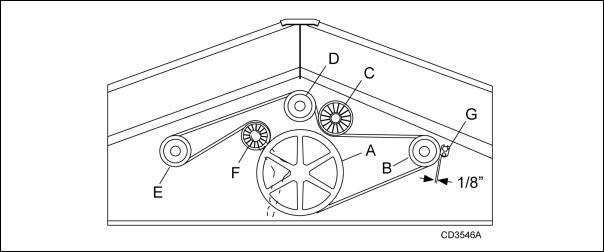
Use SAE 80W or 90W gear lube in the gearbox. Fill to plug on side of gearbox.
Check gearbox daily for evidence of leakage at both seals and the gasket between the housing and cover. If leakage is noted, repair immediately. There may be a small amount of lube emitted from the vent plug; this is not considered leakage.
Overfilling the gearbox will cause the excess gear lube to blow out vent plug and ruin the belt.
Driveshaft Lubrication
Lubricate the driveshaft slip joint every 8 operating hours. Failure to maintain proper lubrication could result in damage to U-joints, gearbox, and driveshaft.
1.Lower mower to ground.
2.Apply grease at the three locations as shown in Figure 10.
3.Raise and lower mower several times to distribute grease.
BELT
Belt Replacement
One of the major causes of belt failure is improper installation. Before installing a new belt, check the following:
1.Check pulley shafts and bearings for wear.
2.Check pulley grooves for cleanliness.
3.Make sure spindles turn freely and without wobble.
If grooves require cleaning, moisten a cloth with a nonflammable, non-toxic degreasing agent or commercial detergent and water.
Avoid excessive force during installation. Do not use tools to pry belt into pulley groove. Do not roll belt over pulleys to install. This can cause hidden damage and premature belt failure.
Belt Installation
Refer to Figure 11.
NOTICE
■ Use care when installing or removing belt from spring-loaded idler at step 5. Springs store energy when extended and, if released suddenly, can cause personal injury.
1.Disconnect idler spring from deck lug.
2.Slide belt under drive pulley A and over idler arm. Position belt around drive pulley A.
3.Loosen bolt holding belt guide G and swing it away from pulley B. Route belt around pulley B, idler C and pulley D as shown.
4.Make sure belt is on drive pulley A, route around idler F, and connect idler spring to lug on deck.
5.Grasp belt between spindle pulley E, spring loaded idler F and spindle pulley D. Pull spring loaded idler with belt to obtain enough belt length to route it over pulley E. Make sure spring-loaded idler pivots freely with belt installed.
6.Adjust belt guide G to provide 1/16" to 1/8" clearance from belt. Tighten bolt to 85 lbs-ft.
Figure 11. Belt Routing
5WPMAN0242 (Rev. 7/21/2008) |
Owner Service 15 |
|
|
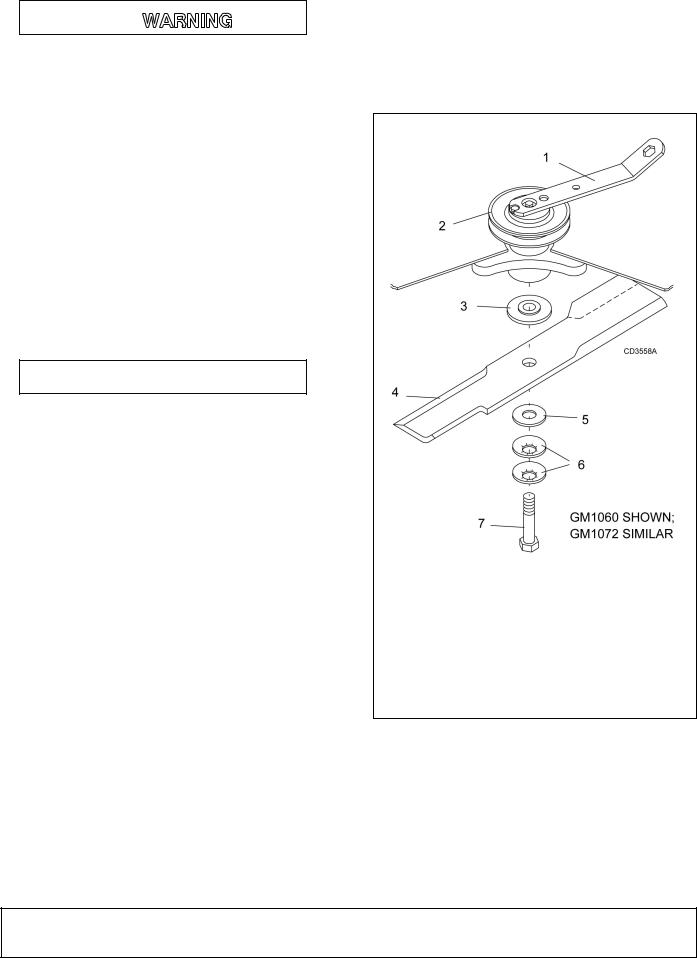
BLADE

Before dismounting power unit or performing any service or maintenance, follow these steps: disengage power to equipment, lower the 3-point hitch and all raised components to the ground, operate valve levers to release any hydraulic pressure, set parking brake, stop engine, remove key, and unfasten seat belt.
Keep all persons away from operator control area while performing adjustments, service, or maintenance.
Inspect blades for condition and proper installation each time before operation. Replace any blade that is bent, excessively nicked, worn or has any other damage. Small nicks can be ground out when sharpening.
Blade Removal
 CAUTION
CAUTION
Your dealer can supply genuine replacement blades. Substitute blades may not meet original equipment specifications and may be dangerous.
1.Remove belt shields.
2.Install blade spindle wrench (1) onto spindle pulley as shown.
3.Remove cap screw (7) which has RIGHT HAND THREADS, cup washers (6), washer (5), and blade
(4).
4.Shoulder washer (3) will not normally come off unless intentionally removed.
Blade Installation
NOTICE
■We recommend you install a new Nylok blade bolt when you replace the blade.
■Do not substitute any bolt for the special blade bolt. It is self-locking, meeting the non-loosening requirements for this application.
1.Install spindle lock wrench (1) onto spindle pulley as shown.
2.Install shoulder washer (3) (if removed), small end up. Make sure blade cutting edge is positioned to
lead in clockwise rotation, as viewed from top of mower.
NOTE: Excessive blade slipping can cause cup washers to burn and lose their clamping force. Inspect cup washers to determine if they are burned or have lost their clamping force. Replace as necessary.
1.Wrench, Blade spindle
2.Pulley
3.Washer, Shoulder .63 x 3.00 x .44
4.Blade
5.Washer, Flat 5/8 standard
6.Washer, Cup .63 x 1.75 x 14 Ga
7.Screw, HHCS Nylok 5/8 NC x 2 GR5
Figure 12. Blade Assembly
3.Install two cup washers (6), washer (5) and blade
(4) on cap screw.
4.Install cap screw and blade assembly into spindle. Torque cap screw to 170 lbs-ft.
5.Remove blade wrench from pulley.
6.Replace belt shields.
16 Owner Service |
5WPMAN0242 (Rev. 7/21/2008) |
|
